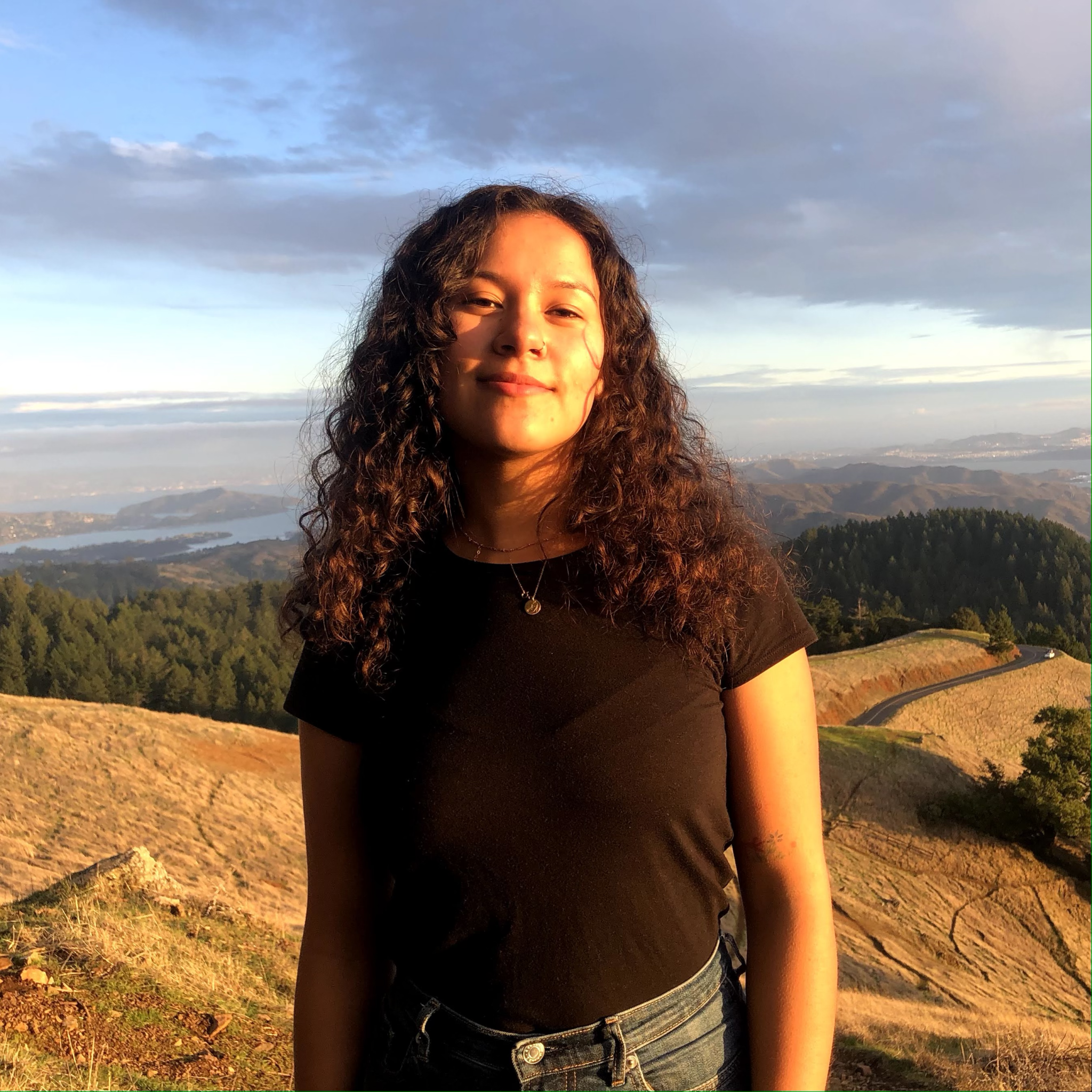 By Christine Haggin, Urban Agriculture Assistant
By Christine Haggin, Urban Agriculture Assistant
The COVID-19 pandemic has taken the traditional definition of the classroom and flipped it on its head. Instead of expansive auditoriums and lecture halls, students found themselves earning diplomas from their childhood bedrooms. And, while it can feel anticlimactic to finish your degree in a living room on a random Thursday afternoon, the woes of Zoom university have admittedly helped us redefine what it means for a space to be a place of learning. As a response to the pandemic, Berkeley Food Institute has also challenged what learning looks like (and where it traditionally occurs) in our 2021 Summer Short Course Series. Sponsored by the Hellman Foundation and in partnership with the UC Gill Tract Community Farm, we traded in the Beaux-Arts libraries for a study spot that was more visceral, more grounding: the farm.
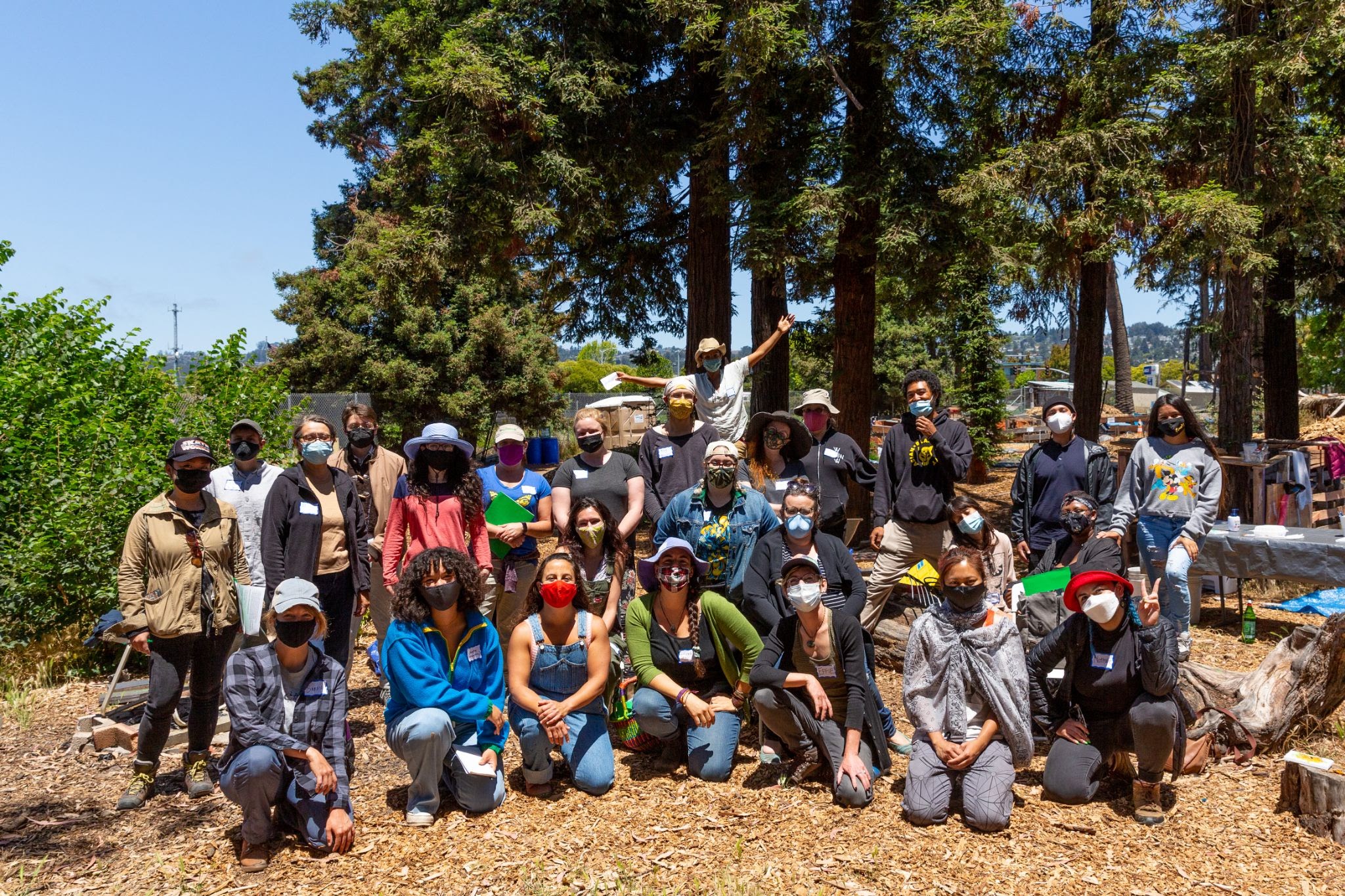
The UC Gill Tract Community Farm is a collaborative community project between the University of California Berkeley and local volunteers located in the village of Huichin, the ancestral land of the Lisjan Ohlone people (Albany, CA). The Farm utilizes 1.5 acres of fields for agroecological farming practices in order to serve the local community with over 20,000 lbs of organic produce and herbal medicine yearly, and also operates as a site for youth education and cultural work through their partnership with Sogorea Te’ Land Trust. Over two separate weekends at the Gill Tract, students from the community successfully completed 3-day intensive courses on Introduction to Urban Agroecology and Introduction to Herbal Medicine and Allyship. Throughout the experiences, two separate cohorts of 20 students (of a multitude of backgrounds: elementary school teachers, food service workers, UC Berkeley students, regular Gill Tract Farm volunteers, home gardeners, and so much more!) each learned about the history of the farm, crop planning and rotation, queer ecologies, plant propagation, herbal infused oils and tincture making, herbal first aid and so much more.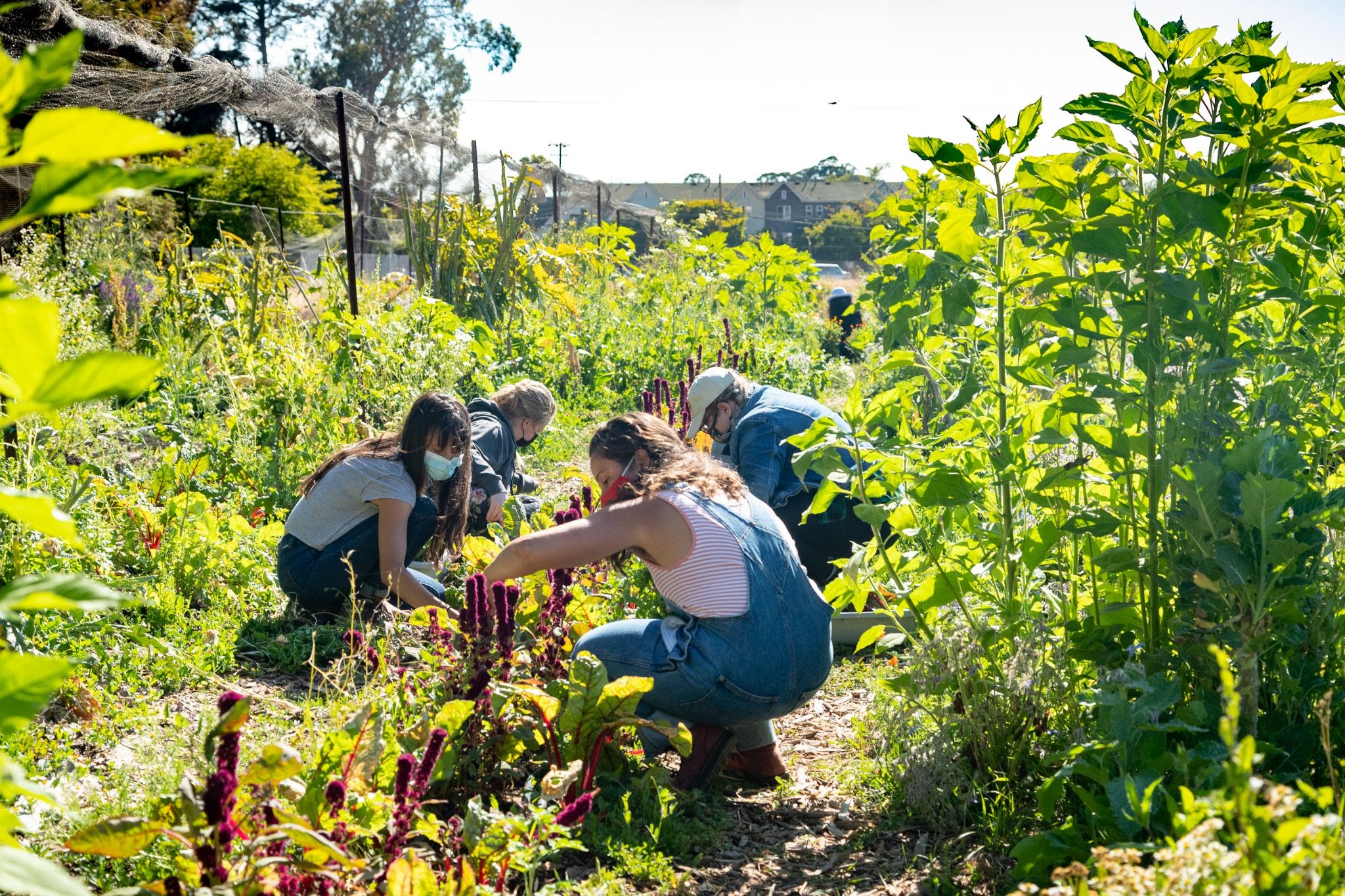 Facilitated by community members and regular Gill Tract Farm volunteers, all of the lessons were informed by the facilitators’ lived experiences on the farm. I was personally struck by how deep the knowledge of every single facilitator was, especially as some of them had been working on the Gill Tract land for over 10 years. Not only did the courses highlight the intimate relationship each facilitator had with the land, they felt like a celebration of specificity.The type of stewardship practiced at the UC Gill Tract Community Farm is one curated by generations of accrued knowledge about the farm’s microclimate, the crops and cultivation practices of the Ohlone people, and each facilitator’s lived experience learning from the most knowledgeable teacher of all: the land itself.
Facilitated by community members and regular Gill Tract Farm volunteers, all of the lessons were informed by the facilitators’ lived experiences on the farm. I was personally struck by how deep the knowledge of every single facilitator was, especially as some of them had been working on the Gill Tract land for over 10 years. Not only did the courses highlight the intimate relationship each facilitator had with the land, they felt like a celebration of specificity.The type of stewardship practiced at the UC Gill Tract Community Farm is one curated by generations of accrued knowledge about the farm’s microclimate, the crops and cultivation practices of the Ohlone people, and each facilitator’s lived experience learning from the most knowledgeable teacher of all: the land itself.
 Each morning, before students arrived on site, facilitators loaded up wheelbarrows with foldable tables and chairs and lugged them across the farm, placing them in a circle within a clearing between the eucalyptus and redwood trees. It was there that we listened to lectures on planting by the moon, food distribution during a pandemic, plant allyship, and permaculture principles. By combining hands-on, place-based learning with informative and educational lectures, these short courses truly brought the classroom to the farm. After experiencing the courses myself, I can attest that there’s a special magic to this type of learning; where else can you learn about the importance of soil health and regenerative practices, and then walk 20 feet, pick up a pitchfork, and build your own compost pile?
Each morning, before students arrived on site, facilitators loaded up wheelbarrows with foldable tables and chairs and lugged them across the farm, placing them in a circle within a clearing between the eucalyptus and redwood trees. It was there that we listened to lectures on planting by the moon, food distribution during a pandemic, plant allyship, and permaculture principles. By combining hands-on, place-based learning with informative and educational lectures, these short courses truly brought the classroom to the farm. After experiencing the courses myself, I can attest that there’s a special magic to this type of learning; where else can you learn about the importance of soil health and regenerative practices, and then walk 20 feet, pick up a pitchfork, and build your own compost pile?
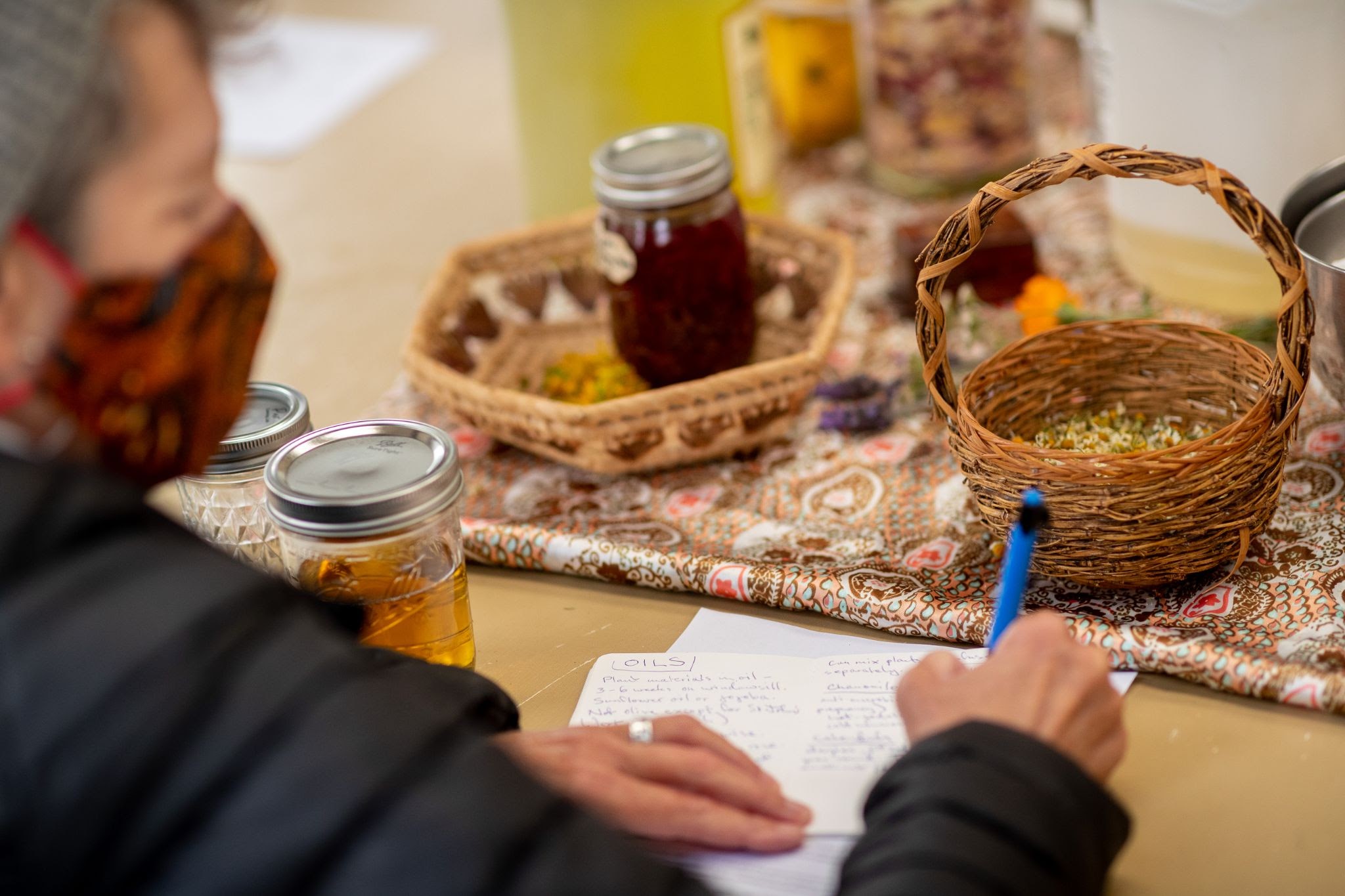 And students got to take home more than just newly acquired knowledge; facilitators made sure no one went home empty handed, and gifted students with tools to continue deepening their learning experiences, even after the courses ended. Urban Agroecology students received seeds and starts so they could apply their newfound knowledge on integrated pest management and agroecological principles in their own outdoor spaces. Herbal Medicine students brought home nettle starts to plant and jars of herbal infused oils they started during the course to complete over the course of the next month, along with tinctures, teas, essences, and DIY herbal first-aid kits they created at the farm. I keep my dropper of water-based sunflower essence (different from essential oils, which are not intended to be ingested) made by one of our facilitators, Hannah Pearl, next to my water jug now, and add a couple drops to my cup every now and then. Sunflower essence is said to help with confidence and leadership; whether or not it has actually changed my mood, I’m reminded with each drop of the intention that went into creating this medicine, and I’m thankful.
And students got to take home more than just newly acquired knowledge; facilitators made sure no one went home empty handed, and gifted students with tools to continue deepening their learning experiences, even after the courses ended. Urban Agroecology students received seeds and starts so they could apply their newfound knowledge on integrated pest management and agroecological principles in their own outdoor spaces. Herbal Medicine students brought home nettle starts to plant and jars of herbal infused oils they started during the course to complete over the course of the next month, along with tinctures, teas, essences, and DIY herbal first-aid kits they created at the farm. I keep my dropper of water-based sunflower essence (different from essential oils, which are not intended to be ingested) made by one of our facilitators, Hannah Pearl, next to my water jug now, and add a couple drops to my cup every now and then. Sunflower essence is said to help with confidence and leadership; whether or not it has actually changed my mood, I’m reminded with each drop of the intention that went into creating this medicine, and I’m thankful.
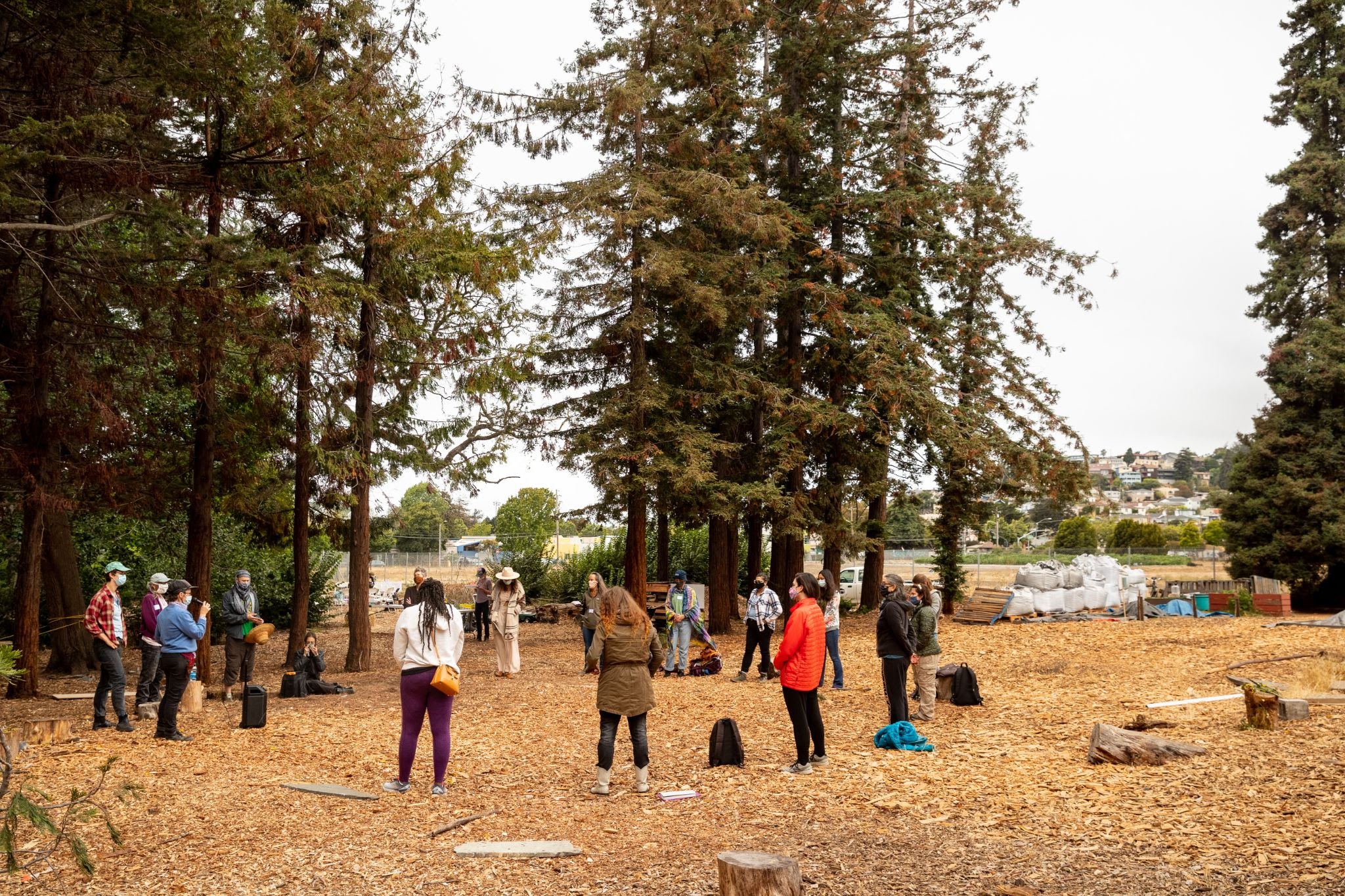 As a student within the College of Natural Resources at UC Berkeley, I’ve taken quite a few classes about agroecology, ecological processes, and environmental history. However, especially as a transfer student that began attending Berkeley right in the height of the pandemic, I haven’t had many opportunities for hands-on education. It’s within spaces like the Gill Tract, along with the farms and gardens that make up the Berkeley Student Farms coalition, that have truly made up the bulk of the learning that I will take with me after graduation. Not to mention, I’ve learned how impactful it is to gain specific knowledge about the place I reside, creating a way to apply the things I’ve learned through my more general studies within the university to my everyday places. My own experiences learning through land-based opportunities demonstrate how necessary it is to protect spaces like the Gill Tract, which (especially in urban spaces) face risk of displacement and eviction due to development and struggles for land access. Learning together on the land is an essential component of the work toward land sovereignty, food justice, and community resilience. Over the past few weeks, I’ve witnessed first-hand the power in learning as a collective, in community with each other, the plants, and the land.
As a student within the College of Natural Resources at UC Berkeley, I’ve taken quite a few classes about agroecology, ecological processes, and environmental history. However, especially as a transfer student that began attending Berkeley right in the height of the pandemic, I haven’t had many opportunities for hands-on education. It’s within spaces like the Gill Tract, along with the farms and gardens that make up the Berkeley Student Farms coalition, that have truly made up the bulk of the learning that I will take with me after graduation. Not to mention, I’ve learned how impactful it is to gain specific knowledge about the place I reside, creating a way to apply the things I’ve learned through my more general studies within the university to my everyday places. My own experiences learning through land-based opportunities demonstrate how necessary it is to protect spaces like the Gill Tract, which (especially in urban spaces) face risk of displacement and eviction due to development and struggles for land access. Learning together on the land is an essential component of the work toward land sovereignty, food justice, and community resilience. Over the past few weeks, I’ve witnessed first-hand the power in learning as a collective, in community with each other, the plants, and the land.
If you’re interested in supporting and/or learning about hands-on food systems research and education opportunities at UC Berkeley, BFI is hosting a Back to School Food Systems Field Day at the Oxford Tract Farm on September 9, 2021. Learn more here.
Some more ways to connect with BFI, the Gill Tract, and Berkeley Student Farms: